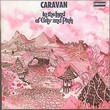|
|

Speakers' corner Following up our retro scope series of 2006 and 2007, 2009 and 2010 - here's the ever-continuing, never-stopping New Speakers' corner! Luna Kafé's focused eye on great events, fantastic happenings, absolute milestones, or other curious incidents from the historic shelves/vaults of rock. Yet again, the Lunar spotlight beam has captured a 40 year old record from the days of prog. A platter of the cosmic era, from the canterbury scene. According to dictionary.com: car·a·van [kar-uh-van] noun: 1. a group of travelers, as merchants or pilgrims, journeying together for safety in passing through deserts, hostile territory, etc. 2. any group traveling in or as if in a caravan and using a specific mode of transportation, as pack animals or motor vehicles: a caravan of trucks; a camel caravan. 3. a large covered vehicle for conveying passengers, goods, a sideshow, etc.; van. 4. Chiefly British. a house on wheels; trailer. Choose either one.
Caravan I have a weak spot for the Canterbury scene. It started with the 1960s beat band The Wilde Flowers and spread out to a vast amount of bands and artists comprising Soft Machine, Robert Wyatt, Hugh Hopper, Kevin Ayers, Daevid Allen, Gong, Caravan, Hatfield & The North and National Health to name but a few. A brief history of the scene can be found in an earliers Luna menu about the song "Memories". As members of The Wilde Flowers drifted off and eventually started Soft Machine, the remaining struggled on for a while, gave in and a few months later, in early 1968, started Caravan instead. In many ways Caravan can be seen as Soft Machine's little brother. Apart from the same origins, with band members growing up in or around Canterbury and playing in The Wilde Flowers, both bands started out writing songs in the pop-rock vein with leanings towards psychedelia, a little bit of jazz and progressive rock, and whimsical, mainly humorous, lyrics. Distorted organ was a vital element in both groups' sound in the beginning. But while Soft Machine turned left into the jazz-rock, fusion and jazz field, Caravan developed, but kept closer to the starting point, though, of course, the music grew more refined as the members gained more skills. In The Land Of Grey And Pink was released on 8 April 1971. It was Caravan's third album, all the three had the same line-up, and it turned out to be the band's creative peak. It's also a cornerstone in the recorded output of the entire Canterbury scene. The album is not that different from its predecessor If I Could Do It All Over Again, I'd Do It All Over You (from September 1970), only more cohesive and better. Whereas the instrumental solo duties had been shared by guitarist Pye Hastings and keyboard player Dave Sinclair on the first two albums, by now cousin Dave had taken over the central role. His uplifting organ playing and sound is not all over the place on side 1 of the original LP, but he squeezes in solos on three of the four songs. Well, it's played on mellotron and piano on the opening "Golf Girl", in addition to a jolly trombone and flute. And the organ is all over the place of the second half of the otherwise folkish and occasional quiet "Winter Wine". The grand opus "Nine Feet Underground", on the other hand, with nine parts occupying the entire side 2, is an almost instrumental organ-driven epos, interspersed by a bit singing here & there. I'm normally not too keen on long solos, but this is definitely different from the hey-don't-you-think-I'm-the-world's-greatest-on-my-instrument kind. Dave continues what Mike Ratledge did on the John Peel-session version of Soft Machine's "Moon In June". It sounds very easygoing, playful and intuitive. Not calculated and overrehearsed, not at all. Sublime! Cousin and bass player Richard Sinclair's distinct voice on most of the songs, adds to the relaxed feel of the album. The singing by Pye Hastings on "Love To Love You (And Tonight Pigs Will Fly)" demonstrates why Caravan suffered after Richard left the band. This pop song is saved by Pye's elder brother Jimmy's joyous flute. Jimmy Hastings was never a permanent member of the band, but popped up as a guest musician on most Caravan albums. His flute and sax playing is all the same a vital part of the Caravan sound. The lyrics were perhaps not Caravan's strongest asset. They were
mainly put together at the last minute before recording, after the
music, including the vocal melody,
had been sorted out. They deal with everyday life with a twist or are of
the stream of consciousness kind. Not the deepest or most profound
existential lyrics around -
or maybe - after all - because of the spontaneity - just that. Here's
one example: (Coughlan, Hastings, Sinclair & Sinclair) Standing on a golf course Dressed in P.V.C. I chanced upon a Golf Girl Selling cups of tea She asked me did I want one Asked me with a grin For three pence you can buy one Full right to the brim So of course I had to have one In fact I ordered three So I could watch the Golf Girl Could see she fancied me And later on the golf course After drinking tea It started raining golf balls And she protected me Her name was Pat And we sat under a tree She kissed me We go for walks In fine weather All together On the golf course We talk in Morse. Dave Sinclair left Caravan a few months after the release of In The Land ... and was soon to join Robert Wyatt's post Soft Machine band Matching Mole and then Hatfield & The North for a little while. He was replaced by Steve Miller, ex-Delivery. The music took a looser turn, towards jazz and a little bit of blues, but the fourth Caravan LP, Waterloo Lily, was after all quite characteristic of the band despite this and more electric piano instead of the organ. Pye Hastings and drummer Richard Coughlan didn't approve on the direction of the band, with the result that Steve Miller and Richard Sinclair left. Caravan recorded one more excellent album, For Girls Who Grow Plump In The Night, with Dave Sinclair back in the fold before the decay with more mainstream songs and production really started. There is at least one later Caravan highlight, however, the album Back To Front from 1982 where Richard Sinclair made a swift comeback with his old buddies of the original line-up. It was followed by a standstill until 1990. Since then the band has kept going mostly without Richard S. until this very day. I had a close encounter with the band including Jimmy Hastings one evening in late October 1996. The highlight was the familiar organ riff of "Nine Feet Underground" and the following twentysomething minutes. A true classic from a classic album! Copyright © 2011 JP PS! A three disc 40th anniversary deluxe version of the album will be released by the end of May with bonus tracks and including new stereo and surround mixes by Steven Wilson (of Porcupine Tree, No-Man and Blackfield fame), in the same manner as his work on the 40th anniversary series of King Crimson's vintage 1969-74 albums.
|
| © 2011 Luna Kafé |
